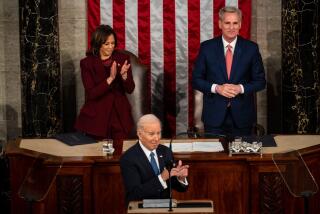Leadership, Please, on Medicare
- Share via
Republicans are calling on President Clinton to take the lead in proposing changes to save Medicare from insolvency. The advice is sound as well as urgent. In five years the trust fund that pays for hospitalization under Medicare will be broke. By then, the Congressional Budget Office says, Medicare’s net outlays will have risen to about $345 billion from $198 billion. Quick fixes, like the limits on payments to hospitals and others that Clinton pushed through in 1993, simply delay the day of reckoning. It’s clear that only basic structural changes can rescue Medicare. Republicans, still seething over Clinton’s gross distortion of their earlier proposal to limit Medicare’s rate of growth, are not going to take the initiative. That responsibility rightly rests with the president.
Medicare is one of several enormously swollen entitlements (Social Security is another) that now account for fully half of federal spending. In 15 years the oldest of the baby boomers will turn 65, putting huge new strains on entitlement programs. More than 110 million Americans in the work force now pay tens of billions in payroll taxes to finance Medicare and Social Security. But the ratio of workers to retirees is steadily dropping. To retain comparable levels of benefits for future retirees, the CBO estimates, taxes would have to increase 50% by 2030. That is politically impossible.
Obviously the pace of Medicare’s growth has to be slowed. Last year the government spent about $4,800 on each Medicare beneficiary. That’s projected to rise to $8,400 over just five years. One way to slow the growth in government outlays is to shift more of the system’s costs to its 37 million users. Part B of Medicare, its voluntary part, covers doctors’ bills and other outpatient expenses. Beneficiaries currently pay about $46 a month for this coverage. The Treasury pays the rest, more than 70% of total costs. Clinton and the GOP have both proposed raising those user-paid premiums in steps, Clinton to $83 a month by 2002, the Republicans to $87. There’s no defensible reason why early bipartisan agreement on premium increases shouldn’t be reached.
About 10% of Medicare recipients are enrolled in managed care plans. For now, managed care seems to have helped hold down the growth rate in health care costs. It’s time to devise an incentive plan to move more Medicare recipients into managed care.
The time has also come to examine whether the eligibility age for entitlements shouldn’t be raised. The life span of Americans continues to increase. But that welcome gain isn’t cost-free. As people live longer into retirement their claims on entitlements mount. Raising the eligibility age for Medicare would require careful preparation and cooperation with private employers to make sure that there is no health insurance gap between the age of retirement--which today averages about 62--and the age of eligibility for Medicare. It’s a difficult challenge, but unavoidable.
During the presidential campaign both Clinton and his GOP opponent, Bob Dole, talked about naming an independent commission to propose changes in entitlement programs. Nonpartisan commissions are useful in providing a degree of political cover to elected officials. They are not a substitute for informed national debate or gutsy leadership. Medicare’s payroll tax-financed hospital insurance trust fund is rocketing toward bankruptcy, Medicare’s rising costs are consuming an ever-larger share of the federal budget. Decisions can no longer be postponed. It’s up to the president to begin, now, to shape a consensus on what has to be done.
More to Read
Get the L.A. Times Politics newsletter
Deeply reported insights into legislation, politics and policy from Sacramento, Washington and beyond. In your inbox twice per week.
You may occasionally receive promotional content from the Los Angeles Times.










